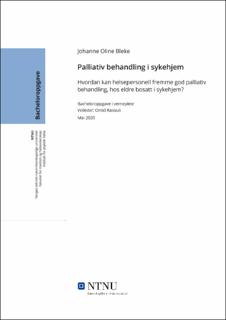| dc.contributor.advisor | Omid Rasouli | |
| dc.contributor.author | Johanne Oline Bleke | |
| dc.date.accessioned | 2020-07-19T16:03:29Z | |
| dc.date.available | 2020-07-19T16:03:29Z | |
| dc.date.issued | 2020 | |
| dc.identifier.uri | https://hdl.handle.net/11250/2669668 | |
| dc.description.abstract | Tittel: Hvordan kan helsepersonell fremme god palliativ behandling, hos eldre bosatt i sykehjem?
Hensikt: Hensikten med denne bacheloroppgaven er å belyse hvordan vernepleiere kan fremme optimal pleie og omsorg, for pasienter i livets siste fase på sykehjem.
Metode: I denne bacheloroppgaven benyttes litteraturstudie som metode. Jeg har utført strukturerte litteratursøk i tre ulike databaser, for å komme frem til fem utvalgte fagfellevurderte artikler. Det er inkludert tre vitenskapelige artikler av kvalitativ forskningsmetode, og to artikler av kvantitativ forskningsmetode.
Resultat: Funn i de vitenskapelige forskningsartiklene viser at fire tema utpekte seg som avgjørende for å fremme god behandling. Dette var: ivaretakelse og involvering av pårørende, etikk og holdninger i arbeidet, viktigheten av forberedende samtaler, og direkte ivaretakelse av den døende.
Konklusjon: For at vernepleieren skal kunne fremme god palliativ behandling vil det være avgjørende å sørge for at pårørende føler seg sett og ivaretatt. Det er viktig for pårørende å motta nødvendig informasjon, da dette vil kunne lette deres sorgarbeid i ettertid. De pårørende bidrar til å trygge pasienten og har god kjennskap til sin kjære. Derfor kan de bidra med informasjon, der pasienten ikke er i stand til det selv. Helsepersonell kan i bruk ta i bruk denne informasjonen når det ønskes å innhente informasjon om pasientens egne ønsker for behandlingen. Med bruk av empati og varsomhet må vernepleieren våge å ta initiativ til å gjennomføre de forberedende samtaler, og innhente informasjon om pasientens preferanser. Slik kan pasienten bli deltakende i avgjørelser om egen behandling. En god måte vernepleieren kan møte etiske utfordringer som oppstår i arbeid med døende, kan være å ha faglige refleksjoner og diskusjonsgrupper innad i personalgruppen. Vernepleieren er underlagt Fellesorganisasjonens yrkesetiske retningslinjer (2019a) som forplikter yrkesgruppen til å ivareta pasientens autonomi og integritet. I livets siste fase skal vernepleieren kunne bistå med utarbeiding av en individuell plan, som vil bidra til å sikre kontinuitet i behandlingen. I tillegg skal vernepleieren kunne gjennomføre observasjon og vurdering av symptomlindrende farmakologisk behandling, ved å være tilstedeværende for pasienten. | |
| dc.description.abstract | Title: How can health care workers provide good palliative care, to elderly in nursing homes?
Purpose: The purpose of this bachelor thesis is to enlighten how social educators can provide optimal care for palliative patients in nursing homes.
Method: The method utilized in this bachelor thesis was a literature study. By conducting a structurized literature search across three different databases, five peer-reviewed scientific articles were found. Three of the articles was based on qualitative research methods, while the remaining two articles were quantitative.
Result: Four common themes were discovered in the articles, that were crucial to provide good treatment. The themes were: Caring for and involving the next of kin, ethics and attitudes at work, the importance of initial conversations with patients, and lastly the direct pain relief care of the dying patient.
Conclusion: In order for the social educators to provide good palliative care, it is important that the next of kin not only receives the necessary information, but also feel that they are seen and cared for. This will make the work of processing their sorrow more manageable. The next of kin can help the patient feel safe, as well as provide information if the patient is unable to do so themselves. The social educators can use the information provided by the next of kin when determining the patient’s preferences for treatment. The social educators must also start the difficult end-of-life conversations in an empathic and careful way to ensure that the patient have a say in their own treatment. A good method to ensure that the social educators are able to meet ethical dilemmas that arise in their work with the dying, could be to have professional reflections and discussions within the employee group. The social educators are required to follow the codes of ethics described in «Fellesorganiasasjonen» (2019a). This commits the social educators to preserve the patient's autonomy and integrity. In the last phase of life, the social educators should be able to contribute to the creation of an individual plan which helps ensure the continuity of the treatment. Lastly, the social educators must be able to observe and assessment the pain relief treatment when working with the end-of-life patient. | |
| dc.publisher | NTNU | |
| dc.title | Hvordan kan helsepersonell fremme god palliativ behandling, hos eldre bosatt i sykehjem? | |
| dc.type | Bachelor thesis | |
